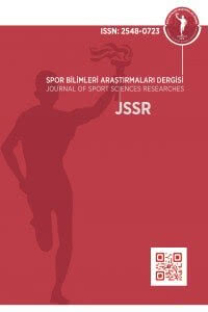An Analytical Study of Self-Talk (Cognitive and Motivational) in the Snatch, Clean, and Jerk Movements of Elite Weightlifters
Weightlifting, Self-talk, Snatch, Clean, Jerk
An Analytical Study of Self-Talk (Cognitive and Motivational) in the Snatch, Clean, and Jerk Movements of Elite Weightlifters
Weightlifting, Self-talk, Snatch, Clean, Jerk,
___
- Abdoli, B., & Akradi, M. (2012). Self-talk in athletes, publications of the Institute of Physical Education and Sports Sciences. Physical Education Organization of the Islamic Republic of Iran. https://doi.org/10.1016/j.psychsport.2015.08.004
- Anoushiravani, S., Jafarnezhadgero, A., Abdollahpour, M., & Yousefi, O. (2021). The Effect of Fatigue on the lower limb muscle electromyography frequency spectrum in teen weightlifters during the Snatch and the Clean and Jerk Lift. Sports Physiology & Management Investigations, 12(4), 115-124.
- Ayala, E., Nelson, L., Bartholomew, M., & Plummer, D. (2022). A conceptual model for mental health and performance of North American athletes: A mixed methods study. Psychology of Sport and Exercise, 61, 102176. https://doi.org/10.1016/j.psychsport.2022.102176
- Bandura, A. (1986). Social foundations of thought and action: A Social cognitive theory. Prentice-Hall, Inc.
- Bandura, A. (1997). Self-efficacy: Exercising control. Freeman.
- Brown, D. J., & Fletcher, D. (2017). Effects of Psychological and Psychosocial Interventions on Sport Performance: A Meta-Analysis. Sports Medicine, 47(1), 77–99. https://doi.org/10.1007/s40279-016-0552-7
- Davoudi, M., Shetabbushehri, S.N., & Abedanzadeh, R. (2017). The Effect of the Frequency of educational self-talk and Age on the Learning of basketball chest passing skills. Master's thesis. Shahid Chamran University.
- Galanis, E., Hatzigeorgiadis, A., Charachousi, F., Latinjak, A. T., Comoutos, N., & Theodorakis, Y. (2022). Strategic self-talk assists basketball free throw performance under conditions of physical exertion. Frontiers in Sports and Active Living, 4, 1-6. Article 892046. https://doi.org/10.3389/fspor.2022.892046
- Galanis, E., Hatzigeorgiadis, A., Zourbanos, N., & Theodorakis, Y. (2016). Why self-talk is effective? Perspectives on self-talk mechanisms in sport. In Sport and Exercise Psychology Research (pp. 181-200). Academic Press. http://doi.org/10.1016/B978-0-12-803634-1.00008-X
- Hardy, J. (2006). Speaking clearly: A critical review of the self-talk literature. Psychology of sport and exercise, 7(1), 81-97. https://doi.org/10.1016/j.psychsport.2005.04.002
- Hardy, J., Gammage, K., & Hall, C. (2001). A descriptive study of athlete self-talk. The sport psychologist, 15(3), 306-318.
- Hardy, J.T., Hardy, J., & Hall, C.R. (2005). Comparison of test-retest reliability using self-talk questionnaire. Journal of Sport Behavior, 28, 201-215.
- Hardy, L. (1996). A test of catastrophe models of anxiety and sports performance against multidimensional theory models using the method of dynamic differences. Anxiety, Stress, and Coping: An International Journal, 9, 69-86. https://doi.org/10.1080/10615809608249393
- Henriksen, K., Schinke, R., Moesch, K., McCann, S., Parham, W. D., Larsen, C. H., & Terry, P. (2020). Consensus statement on improving the mental health of high-performance athletes. International Journal of Sport and Exercise Psychology, 18(5), 553-560. https://doi.org/10.1080/1612197X.2019.1570473
- Latinjak, A. T., Hatzigeorgiadis, A., Comoutos, N., & Hardy, J. (2019). Speaking clearly... 10 years on: The case for an integrative perspective of self-talk in sport. Sport, Exercise, and Performance Psychology, 8(4), 353. https://doi.org/10.1037/spy0000160
- Mansouri, M., Javdipour, M., & Bagheri, S. (2022). Comparison of the effect of Instructional and Motivational Self-Talk on Performance and Learning of Handball Skills. Motor Behavior, 14(49), 129-154. Http://doi.org/10.22089/mbj.2022.12603.2025
- Mohammadi, H., Azimkhani, A., & Tehranchi, A. (2022). The effect of combined exercises on taekwondo practitioners' motivational and impulsive self-talk. Sports Psychology, Article in Press. http://doi.org/10.29252/MBSP.2022.223237.1092
- Nicolas, M., Vacher, P., Martinent, G., & Mourot, L. (2019). Monitoring stress and recovery states: Structural and external stages of the short version of the RESTQ sport in elite swimmers before championships. Journal of Sport and Health Science, 8(1), 77-88. https://doi.org/10.1016/j.jshs.2016.03.007
- Perko, T. (2014). Radiation risk perception: A Discrepancy between the experts and the general population. Journal of Environmental Radioactivity, 133, 86-91. https://doi.org/10.1016/j.jenvrad.2013.04.005
- Schunk, D. H., & Zimmerman, B. J. (2013). Self-regulation and learning. In W. M. Reynolds, G. E. Miller, & I. B. Weiner (Eds.), Handbook of psychology: Educational psychology (pp. 45–68). John Wiley & Sons, Inc.
- Van Raalte, J. L., Vincent, A., & Brewer, B. W. (2016). Self-talk: Review and sport-specific model. Psychology of Sport and Exercise, 22, 139-148. https://doi.org/10.1016/j.psychsport.2015.08.004
- Vygotsky, L. S. (1986). Thought and language. MIT Press.
- Weinberg, R.S., & Gould, D. (2011). Sports phycology Foundation. Human Kinetics. (363-393).
- Zervas, Y., Stavrou, N. A., & Psychountaki, M. (2007). Development and validation of the Self-Talk Questionnaire (S-TQ) for sports. Journal of Applied Sport Psychology, 19(2), 142-159. https://doi.org/10.1080/10413200601185156
- Zimmerman, B. J. (2000). Attaining self-regulation: A social cognitive perspective. In M. Boekaerts, P. R. Pintrich, & M. Zeidner (Eds.), Handbook of self-regulation (pp. 13–39). Academic Press. https://doi.org/10.1016/B978-012109890-2/50031-7
- Zourbanos, N., Hatzigeorgiadis, A., Tsiakaras, N., Chroni, S., & Theodorakis, Y. (2010). A multimethod examination of the relationship between coaching behavior and athletes’ inherent self-talk. Journal of Sport and Exercise Psychology, 32(6), 764-785. http://doi.org/10.1123/jsep.32.6.764
- ISSN: 2548-0723
- Yayın Aralığı: 3
- Başlangıç: 2016
- Yayıncı: Kadir YILDIZ
An Exploratory Study on Athletic Identity of University Athletes in Selected Sports in Kenya
Elıjah RINTAUGU, Muchiri KAREGA, Ishmael KIRUİ, Francis Mundia MWANGI
Fiziksel Aktivite Düzeyinin Sezgisel Yeme ve Yeme Farkındalığı Üzerine Etkisi
M. Gökhan DİNÇER, Neşe TOKTAŞ, Başak BAYHAN, Cemile BALCI
Aerobik Cimnastikte Diz ve Kalça Eklemi Propriyosepsiyonunun Müsabaka Başarısı ile İlişkisi
Faik VURAL, Berkant ERMAN, Mehmet Zeki ÖZKOL, Tolga AKŞİT
Rekreasyon Eğitimine İlişkin Akademisyen Görüşlerinin İncelenmesi
Ezgi ABAY BEŞİKÇİ, Melike ESENTAŞ DEVECİ
Meral KÜÇÜK YETGİN, Shahla RAY, Halit Eren TAŞKIN, David KOCEJA, Koichi KİTANO, James Bradley RAY, Wilhelmina RAVER
Does Emotional Intelligence Affect Mental Toughness in Physically Disabled Athletes?
Yunus Emre YARAYAN, Ekrem Levent İLHAN, Oğuz Kaan ESENTÜRK, Çağrı ARI, Doğukan Batur Alp GÜLŞEN
Algılanan Yönetim Tarzı Karar Verme Özsaygısını Etkiler mi? Spor Yöneticileri Üzerine Bir Araştırma
